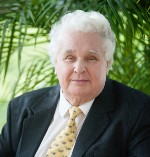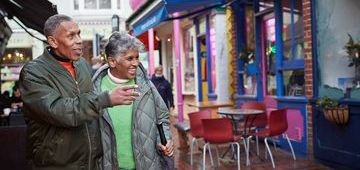
Dr Malcolm Rigler is a retired NHS GP. During his time as a medical student in Bristol he developed a keen interest in Public Health and the way in which Town Councils can respond to the health needs of local residents. Here, he talks about digital health hub, 65 High Street Nailsea and why he believes that every High Street would benefit from having a Learning Centre.
I was born in Poole, Dorset, the youngest of three sons in 1946. My parents were both working-class people. My Mum worked as a cook and housekeeper to a retired Clergyman and my Dad was an unskilled Poole Council workman. Although we lived in a smart detached house, my parents had a very limited income, so my Mother took two housework jobs on top of her own housekeeping work and looking after the family at home.
My Mother had a passion for education that she instilled in me. I started school with a wonder about the world around me and a love of learning. This ordinary story of my life, a working-class boy from Poole in Dorset leads to two very important topics that are close to my heart. I attended Bristol University in the 1960s and soon after "house jobs" I became a GP. At the time only 2% of students who attended medical school came from working class backgrounds and sadly, in 2021, the educational background of doctors has barely changed.
In 2016 the BMJ reported that just 4% of UK doctors come from working-class backgrounds, and explained that medicine remains ‘one of the most inaccessible professions’. The report also highlighted that there wasn’t a single application for medical school from half of all the sixth forms in England between 2009 and 2011. One of the lone examples of a University seeking to change this is Edge Hill University in Lancashire.
Children have missed almost an entire year from school because of Covid-19, and this will only further discriminate against children from disadvantaged backgrounds who have little or no chance of entering medical school. There is a clear need for more attention to be paid to early years learning to help children from all backgrounds have the opportunity to start schools with a genuine love of learning. One of the most-viewed TED Talks of all time is from Creativity Expert, Sir Ken Robinson; Do schools kill creativity? In this talk, Sir Ken argues that for children to be successful in education and in life, imagination needs to be made a high priority. He explains that the imaginative side of life is virtually eradicated by schools.
Another way of nurturing creativity in early years is to try to ensure that children spend time with older people, including grandparents. People who care for them and make them feel safe, whilst at the same time encouraging them to learn about the world around them, whether that’s through feeding ducks in the park or gifts from holidays. In this way, the child's imagination can be stimulated in a warm and loving environment. The World of Stuff and Story in Weston-Super-Mare and Make Believe Arts in Wiltshire are examples of innovative organisations that help early years children to learn to love learning in this way. Both projects use the promotion of story as a basis for human connection. they understand that learning is profoundly important for the wellbeing of children.
I came to understand from my experience of other Arts and Health projects our team supported at Withymoor that opportunities for learning from early years until old age should be much more widely available in every community on the High Street and not just in schools and colleges. Fortunately, these views were shared by Nailsea Town Council and as a result, we have been able to establish 65 High Street Nailsea. This is the first High Street Learning Centre in the UK that is open to everyone and we hope to see many more popping up soon.
Led by Development Manager Ian Morrell and run by volunteers, the hub provides technology and guidance for users to help develop their skills and confidence. The aim is to find out what people want to know and give them one-to-one help. No. 65 is also much more than just a digital help hub. It is a venue at the physical heart of the community, promoting resilience and cohesion. We have creative activities, professional support services, self-help groups and more, for people of all ages. The environment is friendly and informal, underpinned by the knowledge that places connect people.
We believe that having places that connect people on the High Street is much more than just finding premises and opening the doors. There has to be an underpinning ethos, which establishes prioritise that key policy and financial decisions can be assessed against. To be really effective, a health on the high street initiative has to be plugged into local community action, the third sector and statutory agencies. Making a success of this type of venture needs people with a range of skills, which can come from a diverse range of backgrounds. But above all, it needs people who can see the big picture and can translate it into day-to-day actions, reinforcing values and building trusted relationships.
The aim of 65 High Street Nailsea is to show an alternative way of providing healthcare and medical advice. It provides a space that engages the community, inspires young people and shows that medicine is a career that is open to everyone. We seek to support our local GP Practices to help patients learn about their conditions and to connect with others facing the same difficulties or health problems. We believe that this way of working will promote both the health and wellbeing of individuals and the whole community in Nailsea and BSLM shares our enthusiasm for shared consultations.
For more information on 65 High Street Nailsea, you can contact Malcolm at [email protected]
Further reading:



